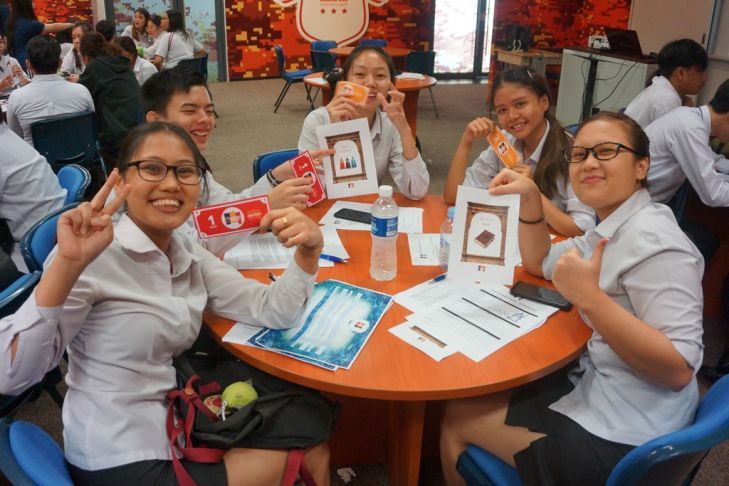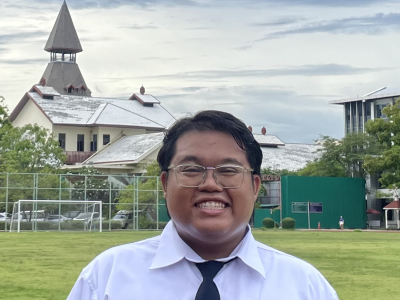
SINGAPORE, 18 July 2019 (Thursday) – A recent study on the effectiveness of the Citi-SMU Financial Literacy Programme for Young Adults shows that almost half of the participants started a regular savings and one in three were able to use the basic financial management tools within three to six months of completing the Programme. The study conducted by a team of researchers at Singapore Management University (SMU)’s Sim Kee Boon Institute for Financial Economics showed that young adults who have gone through the Programme last year demonstrated better financial knowledge and taken steps to increase their level of savings.
The Programme is the first structured peer-to-peer financial literacy programme for pre-tertiary and tertiary students to equip them with essential personal finance knowledge and skills. Since its inception in 2012, more than 30,000 youths have benefited from it. The Programme has also trained and certified 284 student trainers from SMU and 228 affiliate student trainers from the Institute of Technical Education (ITE) and Polytechnics.
For this study that was conducted between January and November 2018, customised pre-programme and post-programme quizzes were administered to test participants on the content covered in the Programme to ascertain if the learning objectives had been achieved. Two asynchronous surveys were then deployed to track the effectiveness of the programme. The first survey collected demographics and data on the financial decision making of participants prior to attending the Programme. The second survey, conducted three to six months after the first survey, tracked changes in the behaviour of the participants' management of their personal finances. The two surveys elicited information on the participants' use of simple tools on financial planning and investment activities. 250 respondents participated in both surveys, more than 1,100 responded to the first survey.
The study found that:
- 60% of the participants in the Programme expanded their basic understanding of personal finance and increased their financial literacy.
The primary beneficiaries of the Programme are tertiary students from low to middle income population who might not have sufficient exposure to basic concepts of financial planning such as budgeting, saving, insurance and basic investment. Therefore, this figure shows the Programme has been useful in adding depth beyond the basic understanding of basic concepts.
- Over 70% of the participants have increased or kept their understanding of financial concepts measured by questionnaires from the World Bank Group’s Global Financial Literacy Survey. As a comparison, a 2015 S&P Global Financial Literacy Survey found Singaporean adults scored 59% in financial literacy – the highest in Asia.
As the main beneficiaries of the Programme are the young adults who might not be in the job market yet, they constitute the less financially-included segments of the population. It is worthwhile to note that nearly 35% of the respondents increased their scores in the Global Financial Literacy Survey three to six months after the Programme.
- More than 29% of the respondents were able to use basic financial management tools such as keeping record of financial transactions and increasing their savings (spending less than they earned) three to six months after the programme.
- As many as 44% respondents started a regular savings account three to six months after attending the Programme, which is about 10% more than before they attended the Programme.
- Three to six months after completing the Programme, 32% felt they were investing their savings prudently, compared to 16% at the time of the Programme.
The study further found that the participants were twice as confident in their ability to invest prudently after learning the basic concepts of investment in the Programme.
- After completing the Programme, about 8% more respondents felt they have adequate insurance coverage compared to before they started the Programme.
SMU Assistant Professor of Finance Aurobindo Ghosh, author of the survey report and Principal Investigator for the Citi-SMU Financial Literacy Programme for Young Adults, observed, “Two of the biggest challenges in deploying financial literacy programmes effectively are delivery and timing. Academic literature has been sceptical on the effectiveness of general financial literacy programme mainly because unlike conventional literacy, financial literacy is a life skill and is needed at the point of use. Therefore, “just-in-time” delivery of the content in an interactive peer-to-peer format with both synchronous and asynchronous game-based environment might be the best way to promote and deploy financial literacy knowledge. Going forward, the research, conducted under the auspices of the SMU Institutional Review Board (IRB), aims to address these challenges by evaluating long term changes of behaviour in financial decision making through more scalable and accessible delivery systems.”
SMU President Professor Lily Kong said, “The results of this study into the effectiveness of the Citi-SMU Financial Literacy Programme have been encouraging. The study showed how the peer-to-peer, interactive and experiential pedagogical model adopted by the Programme has enabled young Singaporeans to achieve better financial well-being by maintaining good financial habits. The Programme has made good progress since its inception. SMU will continue to work closely with Citi to expand the scope and reach of our Programme, so that more young adults in Singapore will be able to benefit.”
Mr Amol Gupte, ASEAN Head and Singapore Citi Country Officer, said, “Citi’s partnership with SMU addresses a gap in the community to impart a life-long skill amongst the youth. With an understanding of personal finance, we empower young people to better plan for their future. This programme underscores Citi’s mission and value proposition to enable progress for our clients and within communities where we do business.”
Highlighting the achievements of the Programme, Assistant Professor Ghosh commented, “Based on the survey data collected from the beneficiaries three to six months after the Programme, we have three major takeaways. First, budgeting is a key concept taught in the Programme, so a nearly 30% increase in financial record keeping and budgeting is a significant improvement. Second, a precursor to better financial health is the habit of savings. Our findings show the students had absorbed this essential concept of financial literacy and are well on their way to being more financially included. Finally, insurance adequacy improved marginally by about 10% three to six months after participating in the Programme, this means that more need to be done to educate participants about benefits of adequate insurance.”
In 2018, the Citi-SMU Financial Literacy Programme for Young Adults reached out to over 4600 beneficiaries from the 3 ITE colleges, and 5 Polytechnics, SMU freshmen and other organisations including Babes Pregnancy Crisis Support, Chinese Development Assistance Council and School of the Arts through its peer-to-peer train-the-trainer programme. Another 7200 polytechnic students also benefited from the MyMoney@Campus activities organised by the Programme.
The full study is available at https://tinyurl.com/citismuresearchreport2018.
###
For more information, please contact
|
Teo Chang Ching (Mr) Senior Assistant Director Corporate Communications DID: 6828 0451 Email: ccteo@smu.edu.sg |
Jimmy Ong Vice President Global Public Affairs (Corporate Citizenship) DID: 6657 5550 Email: jimmy.bh.ong@citi.com |


